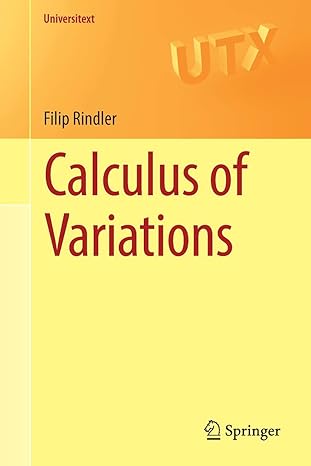Go back


Calculus Of Variations(1st Edition)
Authors:
Filip Rindler

Cover Type:Hardcover
Condition:Used
In Stock
Include with your book
Free shipping: April 04, 2024Popular items with books
Access to 3 Million+ solutions
Free ✝
Ask 10 Questions from expert
200,000+ Expert answers
✝ 7 days-trial
Total Price:
$0
List Price: $89.99
Savings: $89.99(100%)
Book details
ISBN: 3319776363, 978-3319776361
Book publisher: Springer
Get your hands on the best-selling book Calculus Of Variations 1st Edition for free. Feed your curiosity and let your imagination soar with the best stories coming out to you without hefty price tags. Browse SolutionInn to discover a treasure trove of fiction and non-fiction books where every page leads the reader to an undiscovered world. Start your literary adventure right away and also enjoy free shipping of these complimentary books to your door.
Calculus Of Variations 1st Edition Summary: This textbook provides a comprehensive introduction to the classical and modern calculus of variations, serving as a useful reference to advanced undergraduate and graduate students as well as researchers in the field.Starting from ten motivational examples, the book begins with the most important aspects of the classical theory, including the Direct Method, the Euler-Lagrange equation, Lagrange multipliers, Noether’s Theorem and some regularity theory. Based on the efficient Young measure approach, the author then discusses the vectorial theory of integral functionals, including quasiconvexity, polyconvexity, and relaxation. In the second part, more recent material such as rigidity in differential inclusions, microstructure, convex integration, singularities in measures, functionals defined on functions of bounded variation (BV), and ?-convergence for phase transitions and homogenization are explored.While predominantly designed as a textbook for lecture courses on the calculus of variations, this book can also serve as the basis for a reading seminar or as a companion for self-study. The reader is assumed to be familiar with basic vector analysis, functional analysis, Sobolev spaces, and measure theory, though most of the preliminaries are also recalled in the appendix.
Customers also bought these books
Frequently Bought Together
Top Reviews for Books
Amy Bentley
( 5 )
"Delivery was considerably fast, and the book I received was in a good condition."










